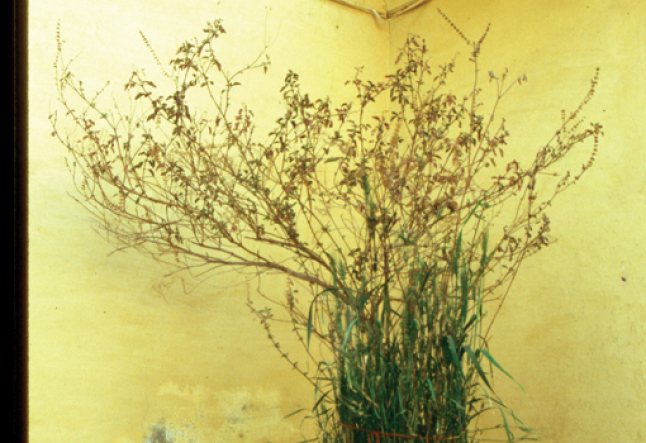tulsi

reverence for plants
What would the world be like if our spiritual traditions taught us that plants were sacred?
In the early morning quiet of a Rajasthani courtyard grows a fragrant herb. It stands erect in its clay pot, reaching in all directions with many soft and slightly hairy branches. Its long, thin purple leaves are covered with essential oil glands that produce a subtle aura which perfumes the surrounding atmosphere, while its crimson flowers blossom in tight whorls.
An elderly woman emerges from an intricately carved wooden door and walks slowly across the smooth, white marble toward the waiting plant. She carries water in a vase, incense and other items of worship.
The plant knows the woman, who comes every day to make offerings, recite prayers and invoke the protective and benevolent blessings that the herb offers.
To a botanist, the plant is Ocimum Sanctum, holy basil, but to the woman it is Tulsi, the goddess who loves Krishna.
The woman performs a simple ritual honoring the plant and its mythological symbolism.
She offers it a drink of water and incense smoke, softly reciting the mantras that invoke the presence of Tulsi Devi, the living goddess, while the plant exhales the aromatic breath that protects the home from disease-carrying insects.
The woman remembers that once, in the magical time of Hindu mythology, Tulsi was passionately in love with Krishna.
Now, having taken the form of this dark-leafed basil, she is always close to her beloved, because Krishna loves to be given offerings of tulsi above all other herbs.
Rituals and ceremonies honoring plants are often based on the traditional understanding of their ecological functions. In the Baghavad Gita Krishna, the incarnation of Vishnu, says, “If you want to worship me, worship the banyan tree.”
Ecologically, the banyan tree produces more oxygen than almost any other tree, revealing that it is indeed the temple of the Vishnu, the sustainer of life. Likewise, Krishna says in the Baghavad Gita, “I am the fragrance of the soil,” again pointing to the presence of the life-sustaining divinity within the biological elements.
Those who worship the tulsi plant frequently pay it homage in the early morning hours, knowing that this is the time when it purifies the air with its biorhythmic production of essential oils.
What would the world be like if our spiritual traditions taught us to respect plants because they have the power to heal our painful illnesses?
In India, where spirituality infuses people’s view of the natural world, holy basil has been revered as a compassionate medicinal plant for thousands of years. Ayurveda describes tulsi as an herb that purifies of the mind, body and spirit by aromatically opening and stimulating the channels of prana.
Tulsi tea is used for a multitude of illnesses, its essential oil giving the leaves a pleasant, spicy taste that dispels phlegm and congestion, stops cough, eliminates nausea, and increases appetite.
It is used traditionally for various types of fevers, infections of the ear, nose and throat, to promote labor during childbirth, and to increase the flow of milk while nursing. It is a stimulant to the mind when exhausted, a purifier of the blood, a remedy for skin diseases, and a beneficial tonic for circulation.
Tulsi essential oil should be used with extreme caution, as it is a powerful irritant if applied directly to the skin.
The oil, with its rich, sweet, fresh-herbaceous scent with pronounced clove and anise accents, is best used in atmospheric diffusers or steam cabinets, one drop at a time and diluted with other oils such as eucalyptus and fir.
Used this way, it can be a very effective respiratory and immune stimulant, helping to overcome chronic conditions such as cold and damp type of asthma, and repeated colds and flus.
For all other uses, the leaves should be infused and taken as tea.
The woman in the courtyard finishes her simple ritual.
She places a tulsi leaf in her mouth as a sacrament, remembering that the incarnated goddess is protecting her family from illness and misfortune. In the days ahead the woman will perform another ritual, marrying Tulsi to her beloved Krishna.
Before humans could walk upon this earth, the plants first worked their photosynthetic alchemy.
They exhaled oxygen so that we could breathe, and ozone to protect us from the deadly solar rays. For unimaginable eons they have been binding toxic atmospheric gases into the soil so that we may grow and thrive.
They regulate the seasons, rejuvenate the soil, and cleanse the poisons we put everywhere.
Every day they give their bodies as offerings of nourishment and medicine.
Shouldn’t we regard plants as the creators and sustainers of our terrestrial home, who are worthy of respect and devotion?
David Crow is the founder of Floracopeia Aromatic Treasures – floracopeia.com